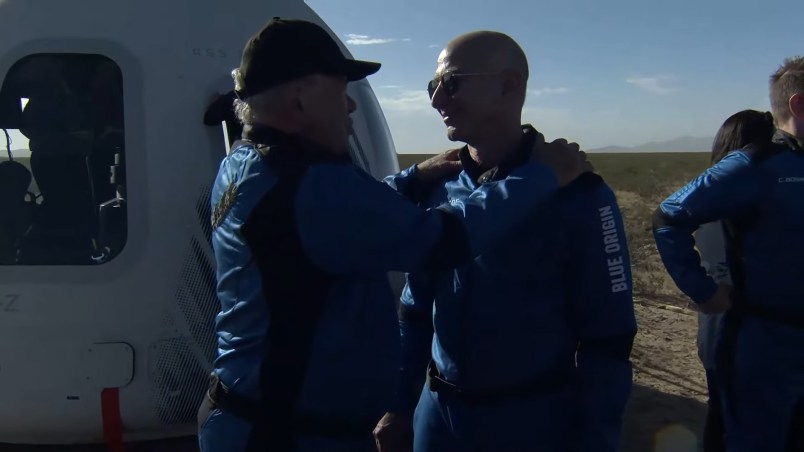As you may have seen, Jeff Bezos invited William Shatner to take a trip on one of his Blue Origin suborbital space flights this morning. It went all according to plan. Shatner spoke about the experience on live television with Bezos by his side.
As a lifelong Star Trek fan I won’t scuff this up with any cynicism or critical voice. It’s 100% awesome. Shatner is 90 and by appearances in fairly robust health for his age. It is still striking, though, and inspiring that someone his age, when the body can become so fragile, can do what he did this morning. For all the refinements and comforts, traveling about 60 miles straight up in 3 or 4 minutes still unleashes vast physical stresses on the body. And yet he popped out of the capsule seemingly none the worse for wear, not even a bit wobbly from the zigzag from 3G to zero gravity and back.
The big quote making the rounds this morning is this: “I hope I never recover from this” – one of Shatner’s first lines after emerging from the capsule. But it’s something very different that caught my attention.
Star Trek and the whole culture of space-anchored science fiction is about the attraction of space, its limitless possibilities: new worlds to explore, new lifeforms to encounter possibly. It’s a story of things to be discovered. Like a child on his first day of school or a young woman leaving home for her first year of college – daunting and perhaps scary but a new vista of possibilities. You are walking toward the future. Earth is less a home than a nest. That’s what has kept generations of kids and people of all ages glued to TVs watching liftoffs, missions to the moon and more. That cult of intrepidity and discovery is at the core of Star Trek. Shatner as Kirk embodies that spirit in its original iteration – masculine, inquisitive, aggressive, fearless.
But Shatner’s comments on return stood this all on its head. His reactions weren’t about first steps on the precipice, with him as some network TV spaceman Moses walking to the edge of the promised land others will explore. He spoke of space as death, darkness, ugliness. He describes having the blue blanket of the Earth’s atmosphere suddenly ripped away moments after takeoff. Suddenly you’re in darkness. “Is it death?” he asks Bezos. He described this as akin to having a blanket suddenly ripped off you before you’re ready to get out of bed.
Shatner’s whole reaction was less the limitless possibilities, something more like being tossed out of Eden. He couldn’t stop talking about the irreplaceableness and fragility of the earth. Apparently Shatner is very big on the climate crisis. So he went into this morning primed with these thoughts. (At 90 he is probably thinking about the approach of the end of life.) So these perceptions are quite timely for his interests, our current moment in climate history and the fact that they are … well, completely true.
There is a whole genre of astronauts commenting on the fragility and uniqueness of the earth viewed from space. Certainly there are dystopian streams of sci fi literature that focus more on the bleakness and frigid loneliness of the expanses of space. But these aren’t the ideas that motivate kids of all ages to dream of space flight and exploring new worlds. It is very much not the culture of Star Trek, even in its latter-day, darker, more questioning iterations.
When Shatner actually went to space he seems to have experienced it more as a warning than a new frontier.






